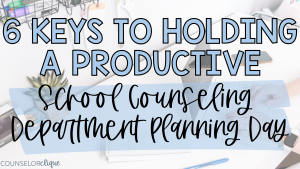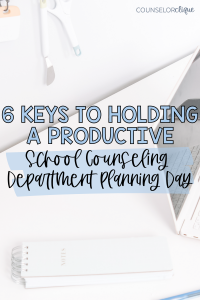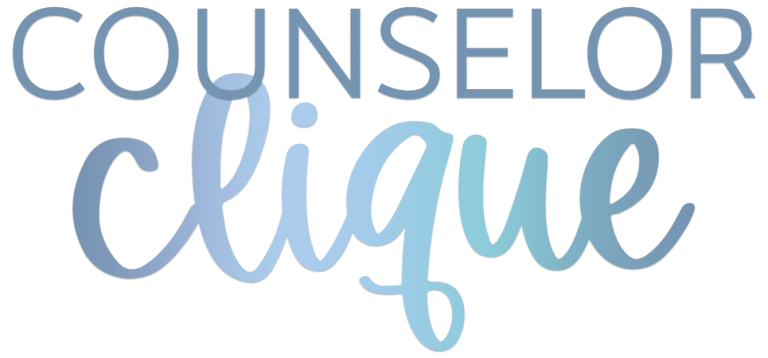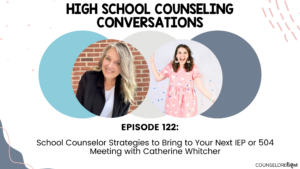*This post contains affiliate links for your convenience. View my disclosure policy here.*
During our prep week, our school counseling department gets off campus together to hold a “School Counseling Department Planning Day.” Our principal has always seen the value in this planning retreat for us (they do one themselves), and we have developed this into a yearly practice ever since the year we worked on our RAMP application off-campus.
We have found a TON of value in doing this off-campus to prevent interruptions. Even if you’re hidden in a room at your school with a DO NOT DISTURB sign on your door, be warned: YOU WILL BE DISTURBED. We have held this “retreat” in a variety of locations: the public library (reserve a study room with a giant marker board for brainstorming), a co-work space that a friend lent to us, and a team member’s newly renovated kitchen table. Anything goes. We make sure we take a break and go out to lunch together to break up the day and spend some time together NOT focused on work for a few minutes.

1- Set an agenda for your planning day.
We set an agenda ahead of time, so that we use our day productively. The date and time frame is clear. We set meeting norms for the year. These norms include: each time we meet, we will respect the meeting times and be in attendance; we’ll be professional in our behavior; and we’ll minimize the use of electronic devices. We’ll also “listen to understand, speak from the heart, suspend certainty, hold space for difference, and slow down the conversation.” (These ideas are from a book called Conversational Leadership by Bill Zieglar and Dave Ramage.) When I focus on these norms, I am most definitely a better team member. We set an expectation to meet every week on an agreed-upon time as a team (this is usually a working lunch with our laptops and lunches in the conference room). We set clear expectations for what professionalism in our department looks like when dealing with parents, communicating with others, and using uniform practices like calendars, website, etc.
A fun way to open our time has been to use this Department Ice Breaker Flipbook with a conversation guide to get to know each other a little better! Another year, we each did the Strengths Finder 2.0 assessment (by Tom Rath) ahead of time. We printed a giant poster to see everyone’s results presented side-by-side. Each team member shared what their top 5 strengths meant to them and how these played into their role on our team in the workplace.
2- Set goals during your planning day.
We discuss our administrators’ school-wide goals and any new district goals or initiatives that are coming into play for the year. We take some time to prep ourselves on some data from the end of the last school year to come in prepared to set our own goals. We set our department’s SMART goals for the year using the ASCA template and model. We each fill out the principal-counselor annual agreement and have it ready for signatures by the end of the week.
3- Review important and useful documents during your planning day.
We share and review documents that we’re going to be referencing a lot at the beginning of the year. This will definitely look differently depending on your school, but some examples of these things for us have been: any scheduling parameter guidelines, any updates to the master schedule, online portals information for our school or district, schedule change policies and procedures, caseload distribution, and more.
4- Use your planning day to divide up the team’s yearly tasks.
A lot of our off-campus time is spent discussing and dividing up our yearly tasks. (Since we divide our caseloads by alphabet, each school counselor works with all grade levels. This means we have to divide other big projects and tasks and have one person take the lead on each one. We call this our “Responsibilities Matrix.”)
We have conversations about each task. Sometimes counselors love the task and want to keep it, and sometimes we barter the ones we don’t really want. Just because you have it one year, does not mean you need to keep it the next! The goal for dividing up these responsibilities is for our counselors to each have tasks that align with both their preferences and strengths. Sign up for my email list here to get this completely editable freebie “Responsibilities Matrix” spreadsheet with some ideas of yearly tasks to divide up!
5- Pick all of your important dates for the year during your annual school counseling planning day.
We look at our calendar for the year. Many of our dates have already been decided in the summer at a school-wide meeting, but we review these and make sure we’re all on the same page. We add these dates to a School Counseling Department Calendar on a public Google Calendar that all counselors share and can add to and all of the public can view. We also set all of our classroom lesson dates on the calendar for the entire year, and we identify which small groups we will run and when they will be held (sometimes this comes after our needs assessment results, too). Of course, there is wiggle room for these; however, have found that if we don’t put them on the calendar from the start of the year, they will always get pushed back and perhaps never completed.
6- Run through your first few days of school plan.
A few minutes of our time is spent discussing our game plan for the first two weeks of school because this comes and goes VERY quickly. We set our agenda items for our first/next official department meeting of the year (where we’ll set up our Common App profile, talk about letters of recommendation best practices, plan for our upcoming “Senior Meetings,” put together a needs assessment for our students, and more).
We summarize our day with action items that need to be taken care of, the school counselor who is responsible for completing it, and a date that it will be done by. This gives us direction moving forward.
Hopefully this sparks some excitement in your back-to-school planning. Whether you already lead your team or you’re bringing ideas to your team’s leadership, a planning day off campus will benefit your school counseling program for the entire school year!






